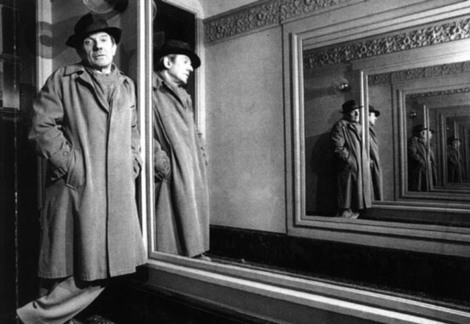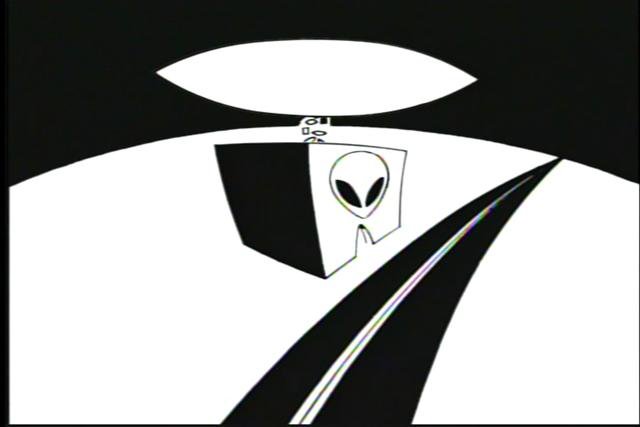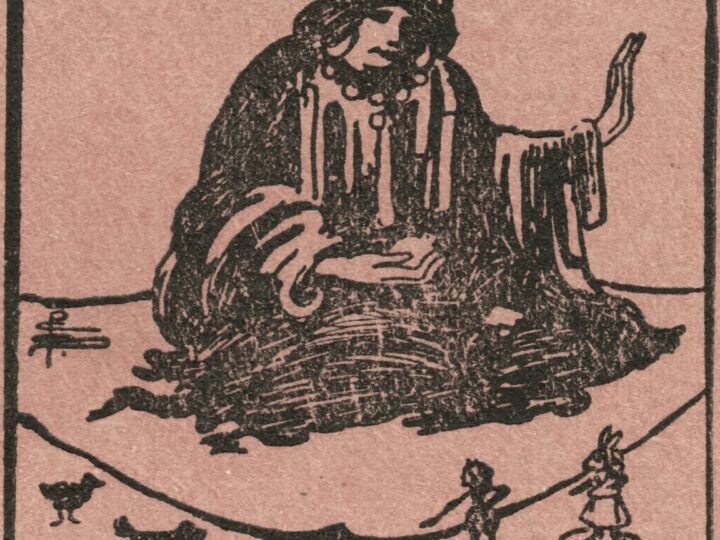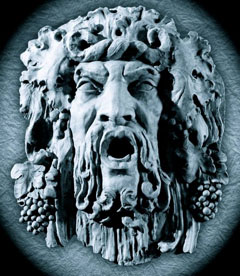
Professor Desire
Though I think he’s crazier than I used to, and some of the rhetoric here I would now abjure, Gilles Deleuze remains one of my favorite philosophers. He remains deeply relevant to the emergent forces of 21st century life, for good and for ill. I wrote this just after graduating from Yale; it’s one of my earliest Village Voice pieces.
It’s difficult to place Gilles Deleuze. A seminal poststructuralist, as rigorous and inventive as any in the postmodern pantheon, he has yet to noodle his way into hipster thought as thoroughly as Derrida, Barthes, Kristeva, Foucault, et al. Maybe this is because his work challenges in ways that Postmodernism 101 doesn’t prepare you for: he is critical of the linguistic turn; science and mathematics emerge from his bag of tricks as often as literature; arcane and wacky metaphors abound; and—most alienating of all to some lofty-brows—he expresses a pleasure in thinking that can be downright intoxicating.
While Deleuze is as happy as any of his cohorts to kiss traditional academic disciplines good-bye, his work begs to be called philosophy and not theory. Deleuze and Foucault were buddies, and they possess similar conceptions of power, a similar technical fetish, coupled with a similar Nietzschean thrash. But Deleuze doesn’t have Foucault’s historical or archeological bent; he prefers to pervert metaphysics itself, producing a surreal philosophy that stands both within and against the world as we habitually conceive of it. In “Theatrum Philosophicum,” Foucault wrote that Deleuze’s discourse deals with the “materiality of incorporeal things,” a perceptual semiotics of “phantasms, idols, simulacra.” For Foucault this was nothing less than a new dynamism in philosophy: “thought is again possible.”
Deleuze comes out of the philosophical tradition, but he certainly doesn’t feel at home there, surrounded by so much he despises: abstraction, Hegel and the dialectic, the whole mythology of the state that erects reason and god as moral legislators. Among the few philosophers he does love (Lucretius, Spinoza, Hume, Nietzsche, Bergson), he finds a subversive spirit, a “secret link which resides in the critique of negation, the cultivation of joy…the denunciation of power.” In the ’50s and ‘60s, Deleuze’s studies of these philosophers remained within traditional philosophical language while nonetheless exploring unconventional interpretive strategies. He later said that he was helped at that time by viewing the history of philosophy as “a screwing process (enculage) or, what amounts to the same thing, an immaculate conception. I would imagine myself approaching an author from behind, and making…a child, who would indeed be his and would, nonetheless, be monstrous.”
In 1972 he published his most important textual monstrosity to date: Anti-Oedipus, co-authored with psychoanalyst Félix Guattari. Written in the still-settling dust of ’68, Anti-Oedipus was primo poststructuralism, a critique of psychoanalysis, anthropology, and party politics. Deleuze and Guattari’s fundamental assertion was that “desire produces reality.” They argued that the Freudian’s insistence on desire as both Oedipal and familial repressed desire’s own potential as a force of liberation. Anti-Oedipus exploded into a general critique of interpretation itself, particularly the way in which analysis always refers to a central paradigm or code. In its place, Deleuze and Guattari proposed a “schizoanalysis,” a fluid movement of desire that “scramble all the codes,” not just in thought but in experience.
Both Anti-Oedipus and its 1980 sequel A Thousand Plateaus were subtitled “Capitalism and Schizophrenia.” The authors contended that capitalism is balanced between its limitless production and the need to socially “codify” this energy in order to keep it under control. The first pole is fragmented and expansive; the second is paranoid and repressive. Deleuze and Guattari saw schizophrenia as an active “multiplicity,” a localized revolutionary force that liberated one from the confines of psychological subjectivity and the fascistic forms of the State.
A Thousand Plateaus, an immense book as encyclopedic and excessive as Pynchon’s Gravity’s Rainbow, delivered the schizoanalysis Anti-Oedipus outlined, though now Deleuze and Guattari called it “nomad thought” or “nomadology.” A Thousand Plateaus is less strictly academic than its predecessor and far more loony. The text is made up not of chapters but of—you guessed it—plateaus. In their introduction the authors explain:
It is a regrettable characteristic of the Western mind to relate expressions and actions…to transcendent ends, instead of evaluating them…on the basis of their intrinsic value. For example, a book composed of chapters has culmination and termination points. What takes place in a book composed instead of plateaus that communicate with one another across microfissures, as in a brain?…We have given [our book] a circular form, but only for laughs. Each morning we would wake up, and each of us would ask himself what plateau he was going to tackle, writing five lines here, ten there. We had hallucinatory experiences, we watched lines leave one plateau and proceed to another like columns of tiny ants…To attain the multiple, one must have a method that effectively constructs it.
The authors hoped that, after reading pages and pages of this stuff, one would enter the turbulent flow of nomad though, not only appreciating the method behind the madness but experiencing its profound and productive momentum as well.
**
In a letter to a particularly vindictive critic, Deleuze described two ways of reading a book. One way, he said, is to consider the book as “a box which refers to an inside, and in that case we look for the signified; if we are still more perverse or corrupted, we search for the signifier…We can comment, and interpret, and ask for explanations, we can write about the book and so on endlessly.” Needless to say, this is the mode of interpretation most of us take for granted, against which Deleuze poses his own, which is also perverse but possibly more fun. “Consider the book as a small a-signifying machine; the only problem is ‘Does it work and how does it work? How does it work for you?’…This other way of reading is based on intensities; something happens or doesn’t happen…It can be compared to an electric connection.”
Such a statement—playful, metaphoric, and technical—is representative of Deleuze. Appreciating what exactly he means by an “a-signifying machine” and reading an “electric connection” is an act of conceptual trust: reading him, you must ride his metaphors. He doesn’t often explicate what he’s doing in familiar terms—particularly in the two volumes of Capitalism and Schizophrenia, which can be both exhilarating and baffling. Not only does he suggest new modes of thinking, but he brings them to bear in his writing, which seems to point beyond itself toward the fantastic ground of its own production. Hallucinatory theory.
By basing reading and writing on “intensities,” Deleuze hopes to turn the text into a flux of passions and actions rather than a system of signs. He and Guattari even suggest reading A Thousand Plateaus as you would listen to a record. These “decodings” obviously possess a certain deconstructive spirit—one “plateau” entitled “Year Zero: Faciality” even deconstructs the face into a wall with holes. But Deleuze’s excursions possess little of the anxious, self-conscious irony of deconstruction. He isn’t overly concerned about the rift between signifier and signified, or the “slipperiness” of meaning. “The object of philosophy is to create concepts,” Deleuze says simply, concepts that are related to both the “functions” of science and the “sensible aggregates” of art.
Like Nietzsche, Deleuze and Guattari are philosophers of forces, not morality or reason—good thoughts are opposed not to bad ones, but to tedious or reactionary ones. Their philosophy resembles particle physics, producing mobile armies of metaphors, images capable of catalyzing all sorts of connections. Machines are everywhere in the universe of Capitalism and Schizophrenia—war-machines, paranoiac-machines, desiring-machines—though Deleuzian machines are anything but “mechanical” entities. Machines describe and enact certain collections of forces and actions, certain ways of organizing and expressing power. “The breast is a machine that produces milk, and the mouth is a machine coupled to it.” Machines are not just material things—armies can become war-machines, but so can symphonies or scientific theories, or kids when they’re at play. Machines produce reality, and Deleuze and Guattari want to wrest these machines—reality’s “means of production”—from the State or from any organization that inhibits them.
By focusing on the dynamic capacity of machines, Deleuze and Guattari also come up with a model of being that dispenses with a notion abhorrent to poststructuralists: the self. Deleuze and Guattari’s “schizoanalysis” posits only a play of forces, shifting relationships of power. Consciousness is a symptom; the subject is the product of various social formations he gets mixed up with. Rather than clinging to an essentially reactionary form of unity (be it on the left or the right), Deleuze and Guattari urge an acceleration of the fragmentation process. The self should be broken up into “multiplicities,” a theater of “becomings” that blurs the distinction between fantasy and the material body. They fashion a hypercultural politics that takes on as many masks as possible: becoming-woman, becoming-child, becoming-addict, becoming-animal, becoming-molecular, any “becoming” that undermines the hegemony of the white male as the central reference point for experience.
Which is not to say that these two are interested in the preservation of nonwhite cultural identities either—fixed identity is fixed identity, the personalized version of the State. The point is to accentuate the multiplicity within the self. Deleuze and Guattari argue that if the self is broken up enough a “body-without-irgans” emerges in its place. This “BwO,” as it is sometimes affectionately called, combines Carlos Castaneda’s pulp sorcery, Antonin Artaud’s peyote narratives, sadomasochistic ecstasy, psychedelic “micro-perceptions,” and Spinoza’s monistic concept of God, among other things. The BwO describes a global force, a pantheism without god. That Deleuze and Guattari’s own texts manifest this odd sense of connection and causality accounts in part for their difficulty and their strange vitality. “Mysticism” is a lousy word to describe these freakier twists and turns, but “psychedelic” is not so bad, especially when you remember that the word means “mind-manifesting.”
The one figure in Capitalism and Schizophrenia who stands above both desiring-machines and the body-without-organs is the nomad. (Actually, it’s not one figure, since nomads always come in packs.) The nomad poses a dynamic force of multiplicity and pure différance against the centralized power of patriarchal meaning (i.e., Rome, God, morality, the tyrrany of the sign). The nomad is also a stand-in for the authors’ own relentless eclecticism. Together, Deleuze and Guattari are polymaths: politics, art, physics, mathematics, history, music, biology, geology, architecture, game theory, linguistics, anthropology, literature, and philosophy are all in their bag of tricks. Their schizoid range of reference can be excessive, even absurd. Figures as diverse as Kleist, Benoit Mandelbrot, Patti Smith, and H.P. Lovecraft pop up, and are not cited so much as woven into the text like patchwork, sometimes being named only in the voluminous notes at the end of the book. Where all this leads is never explicated. The authors don’t analyze thought; they experiment with it.
**
So where are the young Deleuzians? The schizoanalysts? Deleuze and Guattari’s combination of humor, hipness, Foucaultian spirit, and exuberance ought to make them cult favorites, especially with the people who are buying all those expensive translations of Bataille. But no one seems to know what exactly to do with these boys—they’re way too out of hand for leftists, they only skirt deconstruction, and most philosophy professors find their kind of rigor too perplexing. Mad scientists are traditionally suspect figures.
Another problem is the strangeness of their language, which fuses technical invention and surreal play. The conceptual jargon of our dynamic duo can be as dense and impenetrable as your PC’s machine language. This in part accounts for their nebulous influence—even at Yale, a bastion of Francophilic theory jocks, the lit-speak cannot accommodate the body-without-organs. The resistance is understandable; theoretical discourse is convoluted enough without invoking what sometimes seems to be the private language of two crazed, if lucid, savants. Deleuze’s solo works, although sometimes as difficult as Capitalism and Schizophrenia, are often much less convoluted. His tone is different—more accessible, gentle even—and it has certainly been remarked that he would do better by steering clear of Guattari.
When Anti-Oedipus was published in English, the Marxist literary critic Terry Eagleton attacked what he saw as its essentialism of desire, a fairly persistent critique. Most theorists hold that desire is always mediated, never active in a pure form; Deleuze and Guattari believe that it directly alters, or “invests,” the social field. Their books manifest this immediate desire, and even seem to produce it. In Logics of Disintegration, Peter Dews dismissed this affirmation of desire as “naïve naturalism.” And there are those who undoubtedly feel that Deleuze and Guattari have simply renounced all claims of relevance along with all claims of reason.
But the authors’ insistence that their philosophy is “pragmatic” is not so ludicrous once you analyze its political underpinnings. For them, everything is encompassed within overlapping social fields; everything is caught up within relations of power, forms, and statements. He and Guattari advocate a highly localized “micropolitics,” a “schizo-revolutionary” force that liberates desire and everything that desire can drag with it. They oppose fascisms of all forms: fascisms of power, of discourse, of the self. What is to be avoided at all times is a centralization of power. They want to create escape routes within the superstructure, so called “lines of flight.” Their work is pragmatic because it manifests the very activities it calls for, drawing the reader into their world. (One plateau is called “How Do You Make Yourself a Body Without Organs?”) Capitalism and Schizophrenia is essentially an ethics—a self-help book without a self.
By calling their work pragmatic philosophy, Deleuze and Guattari are also challenging the traditional parameters of revolutionary discourse—no one, after all, has discovered the magic formula that transforms theory into praxis. Deleuzian political notions are even more difficult to apply to actual organizations and actions than Foucault’s. The proplem—and it’s insurmountable to many—is that Deleuze and Guattari turn the leftist critical maxim “always historicize” on its head. Even before he joined forces with Guattari, Deleuze was a harsh critic of the dialectic, historical or otherwise, and thus rarely cited historical circumstances. He has always been fixed on incorporeality—his philosophy caresses history. Deleuze is a conceptual vitalist whose description of Foucault could easily describe himself: “Foucault is not content to say that we must rethink certain notions; he does not even say it, he just does it, and in this way proposes new coordinates for praxis.”
Visionary is often a stupid word, but Deleuze does seems to be presaging future paradigms—something like a Franco-philosophical William Blake. Capitalism’s here to stay, folks, and now we’ve got computers, fax machines, and HDTV to accelerate the flow. A figure like Jean Baudrillard, which acutely recognizing the reign of “simulation,” also seems perfectly content to ironically proclaim the hopelessness of action in a world where the individual is “now only a pure screen, a switching center for all the networks of influence.” But capitalism is not a closed system, and Deleuze and Guattari want to take advantage of the zones that open themselves to cross-wirings, to new organizations of cultural politics, to real change—that is, a change in reality. They aim not to make us more humane, but more superhuman, “a new form that is neither God nor man and which, it is hoped, will not prove worse than its two previous forms.”




